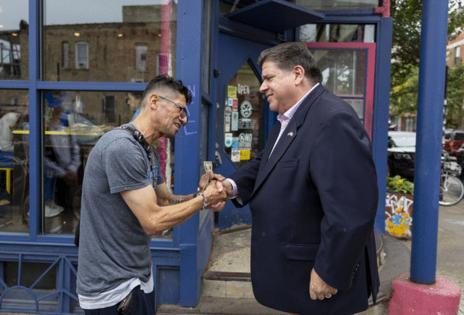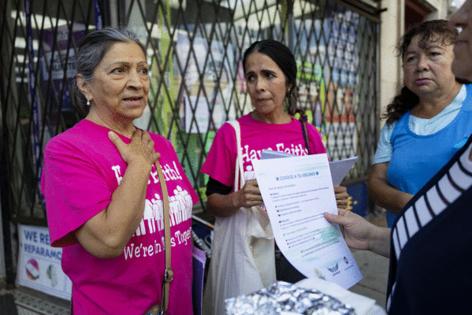Advocates to immigrants as raids loom: Carry your green card, watch out for your neighbor, stay home
Published in News & Features
CHICAGO — As the sun set on a recent evening, families lined up to buy elotes from Olga Martínez, a street vendor in Little Village, one of Chicago’s largest immigrant neighborhoods.
She was still holding on to hope that President Donald Trump wouldn’t follow through on his promise of militarized immigration arrests in the nation’s third-largest city. But reality had begun to sink in, she said, and she decided to close her cart Friday as news of federal agents coming to Chicago intensifies.
“That’s if I don’t hear about operations happening nearby sooner,” she added, feeding leftover corn to pigeons at her feet. “I’m trying to save as much money as I can to stay home, because God knows how long they’ll be here for.”
A pamphlet with “Know Your Rights” information and other advice urging the community to look out for one another hung on the front of her cart. “Get to know your neighbor,” it read.
Information is a lifeline, advocates say.
“That’s the only way we can resist and protect one another,” said Dolores Castañeda, a longtime resident of Little Village and community leader. “We only have each other.”
Castañeda and fellow organizer Doris Hernandez spent Sunday afternoon distributing similar flyers to parishioners after Mass at St. Agnes of Bohemia. They wanted to raise awareness about potential raids and urged immigrants to “not be afraid, but be prepared.”
Later, the two women walked along the 26th Street corridor, handing out flyers to passersby and asking business owners to post the notice in their storefronts.
While details of the scope of arrests and timeline remain unclear, immigrant communities are bracing for impacts similar to those seen in Los Angeles earlier this summer when agents with the U.S. Immigration and Customs Enforcement arrested street vendors, day laborers, construction workers and farmhands. Families recounted being torn apart during large-scale workplace raids.
Community advocates are working to counter the rising fear by sharing legal information and resources with immigrants across Chicago. They’re forming networks of neighbors and volunteers who can support families staying home out of fear.
From conversations in taquerías to neighborhood WhatsApp threads, messages are spreading in multiple languages.
“We need to stay alert to ICE activity to protect each other,” Castañeda said. “We’re asking neighbors to report when someone goes missing, and to stay in a safe place if they feel threatened.”
Among the guidance: Permanent residents should carry their green cards. Individuals in the U.S. without legal permission should stay home if possible. Avoid unnecessary risks.
Advocates are urging families to create emergency plans, especially for their children. This includes identifying alternate guardians, sharing contact information with trusted neighbors and memorizing legal hotline numbers.
Most importantly, know your rights, they say.
“Exercise your right to remain silent and do not consent to search and seizure. Make a plan, and share your emergency contact with a neighbor. Talk to your family about what to do if you’re detained,” said Erendira Rendon, vice president of Immigrant Justice, one of the city’s largest nonprofit organizations that provides access to legal help to immigrants. “If you are a U.S. citizen, assist your family and neighbors; we protect each other, so watch out for one another.”
Rendón added that the deployment of the National Guard signals not a response to violence, but a “precursor to increased detentions and deportations.”
During a news conference Tuesday, Gov. JB Pritzker suggested that Stephen Miller, Trump’s deputy chief of staff, strategically planned to conduct militarized arrests in Chicago because the city is known for its Mexican Independence Day celebrations.
Pritzker added that he is “deeply concerned” ICE will target Mexican Independence Day events, set to start this weekend with the parade in Pilsen on Saturday. Last month, organizers said the upcoming celebration will go on despite deportation fears.
“We are not going to be stopped from celebrating our roots, our heritage, our culture,” said Vicky Lugo, secretary of the United Merchants of Pilsen Chamber of Commerce said Aug. 28.
Similarly, the larger independence day parade in Little Village scheduled for Sept. 14, will also go on as planned, organizers told the Tribune. Meanwhile, downtown, the El Grito Chicago festival is scheduled for Sept. 13-14. El Grito or “the Cry of Independence,” marks the beginning of Mexico’s fight for independence from Spain.
“It breaks my heart to report that we have been told that ICE will try and disrupt community picnics and peaceful parades. Let’s be clear, the terror and cruelty is the point, not the safety of anyone living here,” Pritzker said at the downtown news conference, standing alongside Chicago Mayor Brandon Johnson, Cook County President Toni Preckwinkle and other state leaders.
While Trump remained ambiguous — even in his most recent comments Tuesday — about a timeline or the details of a federal crackdown in Illinois, Pritzker made it clear his administration believes Trump plans to deploy armed military personnel to Chicago’s streets and direct immigration enforcement agents to “raid Latino communities” in the coming weeks.
In Chicago, 1 out of every 5 Chicagoans identifies as Mexican, making them the largest component of the city’s Latino population, according to the latest census data. Many have been in the country for an average of 15 years, raising U.S.-born children, buying homes and opening businesses despite their lack of legal status in the country.
For many, legalization is out of reach because of the complexity of immigration law, costs and policies.
Though Little Village is known as “The Mexico of the Midwest,” immigrant communities – from Belmont Cragin on the north to Midway in the south – are feeling vulnerable.
“We have helped to shape the city, and we make up an important part of the economy. And the worst thing is that they’re (ICE) not just arresting criminals, as they (Trump’s administration) had promised, they’re taking everyone, even us, hardworking people,” said a woman talking to Martínez as she served her elotes in Little Village.
In an effort to show support for the immigrant community, Johnson over the weekend signed a wide-ranging but largely symbolic executive order that “urges” all federal law enforcement to follow Chicago police directives, banning federal agents from wearing masks on duty and requiring them to activate their body cameras at all times when interacting with the public.
Officers or armed forces should also display their federal agency, last name and badge number or rank “in a clearly visible fashion,” per the order.
In Chicago and across the nation, ICE agents and those with other federal agencies have routinely worn masks and not thoroughly identified themselves as they have detained and arrested people that federal authorities say are in the country illegally.
As the days go by, the fear grows in Latino and other immigrant communities across the city and suburbs. This week, some nonprofits that serve immigrants briefly closed their doors to protect their clients and employees.
“Rooted in our community and powered by our people, Enlace Chicago stands in unwavering solidarity with the immigrant community,” said Marcy Rodriguez, co-executive director of Enlace Chicago, which closed its headquarters earlier this week. “For 35 years, we’ve worked alongside partners — from government to grassroots — to keep our neighborhoods safe, informed, and resilient.”
Just miles from the Great Lakes Naval Base, where federal agents are rumored to be stationed, are cities such as Waukegan and North Chicago, home to thousands of immigrant families now bracing for the potential escalation of enforcement operations.
Julie Contreras, a pastor and community leader in Waukegan, said families have been living in fear since Trump took office.
“Immigrant families are seeing firsthand that many individuals being detained are non-criminals, and this has created a real sense of terror for immigrant families in the city of Waukegan and across the USA,” said Contreras, director of United Giving Hope in Waukegan. “Many of the immigrants say they feel like they are being racially targeted and treated like prisoners in the city they love.”
With the help of Contreras, at least a dozen immigrants and asylum-seekers from her church have returned to their home country over the last month, fearing abusive treatment in a detention center if arrested.
Contreras expects that more immigrants will choose voluntary repatriation after exhausting all legal options, rather than risk indefinite detention in a system they view as inhumane and increasingly punitive.
“For our families, this is not about Republicans and Democrats; our families do not have a political agenda. We cannot negotiate lives over political theater,” Contreras said.
As dusk settled over Little Village, Martínez packed up her cart earlier than usual, scanning the street for signs of federal agents. The aroma of roasted corn lingered in the air, mingling with quiet conversations about emergency contacts and rumors of ICE sightings.
In the meantime, Castañeda made her final rounds for the evening, knocking on doors, answering questions and handing out flyers.
“Some people refuse to believe that the raids will actually happen, or that they will, in fact, impact them or their families, but little by little, they are hitting closer to home,” Castañeda said. “I tell them it’s better to be safe and sorry.”
Castañeda hugged Martínez as she said goodbye.
“Call me if you need anything,” Castañeda told the street vendor. “Si Dios quiere, nos seguimos viendo por aquí. God willing, I will see you here later.”
____
©2025 Chicago Tribune. Visit at chicagotribune.com. Distributed by Tribune Content Agency, LLC.










Comments